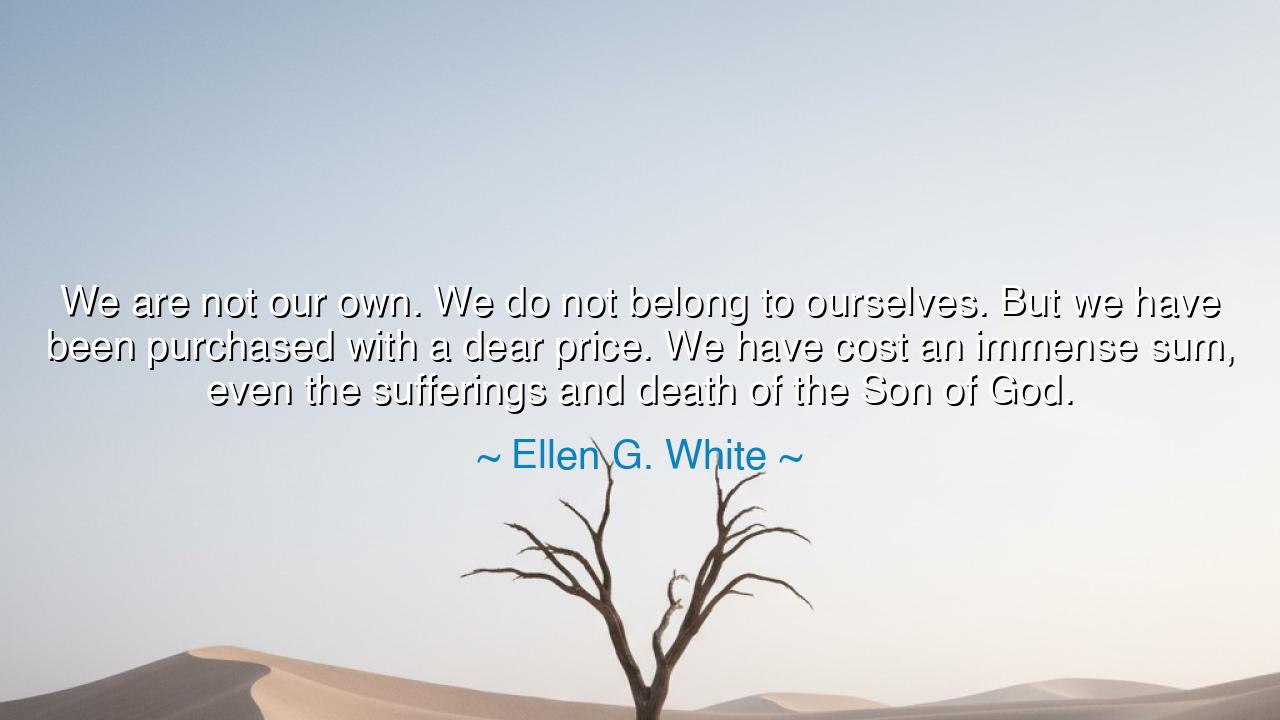
We are not our own. We do not belong to ourselves. But we have
We are not our own. We do not belong to ourselves. But we have been purchased with a dear price. We have cost an immense sum, even the sufferings and death of the Son of God.






The words of Ellen G. White, spoken with the authority of deep faith and moral gravity, echo across generations: “We are not our own. We do not belong to ourselves. But we have been purchased with a dear price. We have cost an immense sum, even the sufferings and death of the Son of God.” In this declaration, the soul hears both the sorrow and the majesty of divine love. These words remind us that life is not a possession, not a private treasure to be spent in vanity, but a sacred trust, bought and redeemed by a sacrifice beyond measure. To live with this awareness is to walk humbly, knowing that one’s freedom and forgiveness were not earned, but gifted—at the highest cost imaginable.
The origin of this quote lies in the writings of Ellen G. White, one of the founders of the Seventh-day Adventist Church and a revered Christian author of the nineteenth century. Her teachings flowed from a heart aflame with conviction that the death of Christ was not merely a historical event, but a personal ransom for every human being. Drawing upon the Apostle Paul’s words—“You are not your own, for you were bought with a price” (1 Corinthians 6:19–20)—she expanded upon the meaning of redemption. To her, Christ’s suffering was not an abstract symbol, but a transaction of love in which heaven poured out its wealth to reclaim the lost children of earth. Thus, when she says “We are not our own,” she speaks of divine ownership not as tyranny, but as deliverance—a transfer from the slavery of sin to the freedom of grace.
To the ancients, the idea of belonging to the divine was both sacred and terrifying. The Greeks spoke of fate as a chain; the Hebrews spoke of covenant. But in Ellen White’s vision, this belonging is neither fatalism nor bondage—it is adoption. Humanity, she says, has been purchased, not by coin or conquest, but by suffering, by blood, by the self-emptying love of God made flesh. Every heartbeat, every breath, every joy we experience is a reminder that our lives have been reclaimed from darkness by that costly redemption. To forget this truth is to live in illusion—to imagine that our lives are ours to waste, our bodies ours to defile, our time ours to squander. But when we remember, humility and gratitude awaken within us, and we see that our existence is part of something eternal.
Consider the story of John Newton, the Englishman who once trafficked in human souls as a slave trader. He was a man sunk in sin, hardened by the cruelty of his trade. Yet one night, caught in a violent storm at sea, he cried out to God for mercy. From that moment on, his heart began to change. He abandoned his wicked profession and became a preacher of grace, writing the immortal hymn “Amazing Grace.” Newton’s transformation was the living embodiment of Ellen White’s words: he realized that he was not his own, that his life had been bought not by his repentance, but by the mercy of Christ. The man who had sold others found that he himself had been purchased—not with gold or silver, but with divine forgiveness.
Ellen White’s words also reveal a profound paradox: that freedom begins with surrender. To belong to God is not to lose oneself—it is to find oneself. In the modern world, we are taught that autonomy is the highest good, that to be one’s own master is the meaning of life. But such independence often leads to emptiness, for the soul cannot bear the burden of its own making. When one accepts that he or she has been purchased by love, life gains direction. The question is no longer “What do I want?” but “What was I made for?” It is in that surrender that purpose is born.
Her use of the phrase “a dear price” stirs the heart to awe. For what greater price could there be than the sufferings and death of the Son of God? To contemplate such a cost is to be humbled. It is to understand that one’s worth is measured not by earthly success, but by divine sacrifice. The cross, then, becomes the mirror of our value. It tells us that we are neither worthless nor our own, but infinitely precious and wholly His. To live heedless of this truth is to cheapen both life and love; to live by it is to walk in reverence and gratitude.
Lesson and Practice:
Live each day as one entrusted, not entitled. Remember that your body, your time, your gifts, and even your suffering belong to a higher purpose. Let gratitude shape your actions, for you walk under the shadow of a great redemption. Serve others as one who has been dearly bought; forgive as you have been forgiven. When pride tempts you to claim your life as your own, recall the price that was paid for it. For as Ellen G. White teaches, our lives are not self-made monuments, but divine inheritances. We have been purchased not by force, but by love—and in that sacred belonging lies the truest freedom the soul will ever know.






AAdministratorAdministrator
Welcome, honored guests. Please leave a comment, we will respond soon